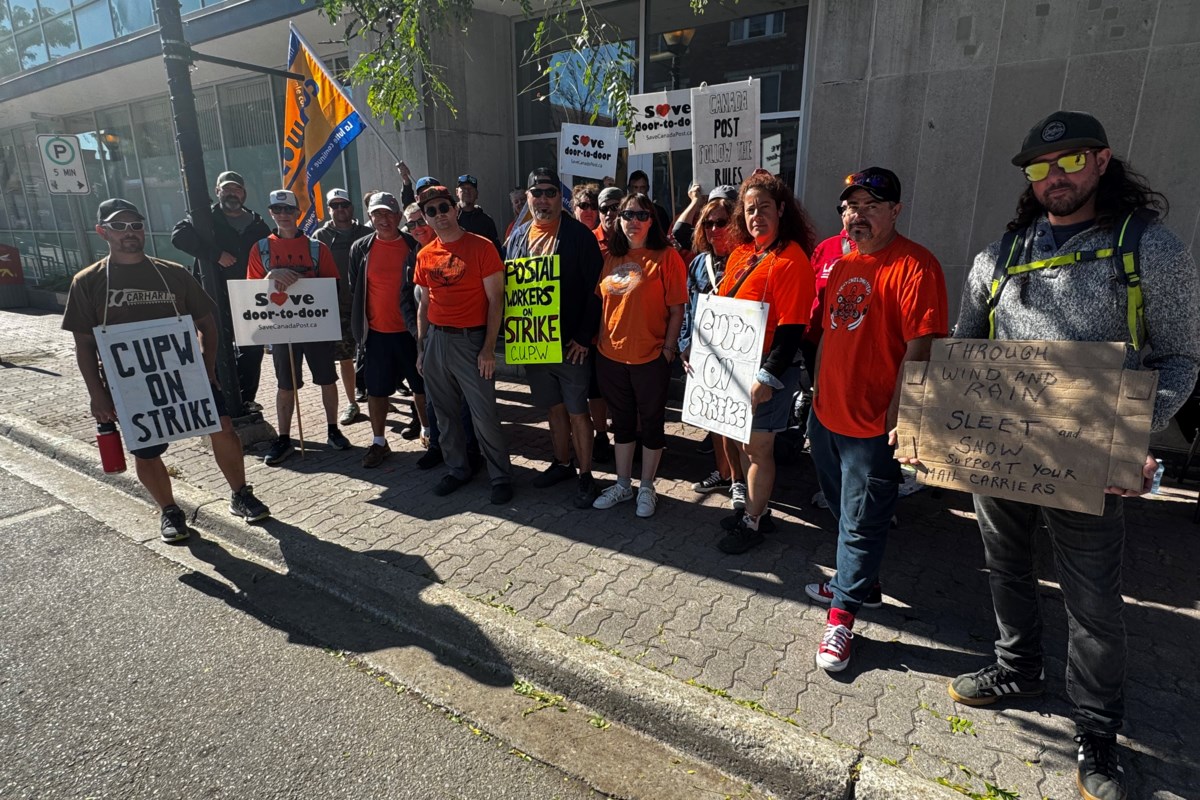‘Both financially and emotionally, I’m in the dump,’ says postal worker who disagrees with union stance; local union rep says they are ‘fighting for service for all Canadians’
The sidewalk outside Orillia’s downtown post office has become the frontline of a national standoff, with about 100 local members of the Canadian Union of Postal Workers (CUPW) on strike and mail delivery in the city completely halted.
For Steve Cormier, vice-president of the Orillia local CUPW 578, the stakes reach far beyond wages. He said the government’s plan to phase out door-to-door delivery and shift Canadians to community mailboxes would “completely gut what Canada Post is and the services that we provide.”
“Eighty per cent of Orillia receives door-to-door delivery,” Cormier said. “That includes older neighbourhoods, rural routes, and many seniors. If these cuts go ahead, a community like Orillia will be on the hit list.”
Cormier said members joined the strike immediately to show solidarity with colleagues across the country.
“We stand in a unified front to make sure Canadians get the service that they deserve,” he said. “Obviously it’s about job protection, but even more it’s about fighting for service for Canadians.”
He added the postal disruption is not what workers want.
“We want to work. We want to service the people of Orillia,” he said. “But their services will be cut exponentially worse if we don’t fight for the cause.”
The unrest among employees has been rolling in some form for more than a year and a half, with rotating bans on overtime and flyers before escalating into a full walkout last week. Cormier said Canada Post has refused to negotiate in good faith and has failed to table a comprehensive offer.
“Honestly, we don’t know what Canada Post’s game is at this point,” he said.
On the picket line, however, not all voices align with union leadership. Veteran worker Cid Casciato, who has been with Canada Post for 20 years, said he does not support the strike.
“I’m just here to get my $50 strike pay so I have some income so I can eat,” he said. “I think we should be working. The strike isn’t going to do us any good, and we’ll never make this money back. The union doesn’t consult with us; they just go and do it.”
Casciato, stationed in Orillia for the past eight years, said he actually supports some of the government’s reforms, including community mailboxes and weekend delivery.
“It makes sense,” he said. “You have to keep the company up to the times. Right now it’s behind the times.”
He said the current and recent strikes have been devastating for workers who rely on Canada Post as their sole source of income.
“Both financially and emotionally, I’m in the dump,” he said. “I’m totally against this. If I could talk to the minister right now, I’d say just order us back to work. You’re going to do it anyway.”
While workers and union leaders express frustration on the ground, Canada Post has laid the blame squarely on CUPW.
In a statement released Friday, the corporation said it is reassessing its offers in light of government reforms and accused the union of triggering a national strike that will “further deteriorate Canada Post’s financial situation.”
The company pointed to $5 billion in operating losses since 2018 and said the union’s proposals would add $700 million a year in new costs. It also criticized demands for more paid personal days, restrictions on contracting out, and provisions that would maintain pay for letter carriers even if mail volumes are low.
“We remain committed to reaching negotiated agreements with CUPW that are affordable, support our people and help build a sustainable future for the company,” the statement read. “Canadians deserve a postal service that is reliable, affordable and sustainable.”
Cormier said those arguments ignore the waste and mismanagement within the corporation. He pointed to top-heavy executive ranks, fleets of unused vehicles, and what he described as a push to funnel business to Purolator, which is majority owned by Canada Post.
“We have a conflict of interest problem,” he said.
For now, Orillia residents are caught in the middle. Horns honked in support on Mississaga Street this week, but some drivers shouted frustrations as they passed the picket line. Cormier said he hopes the community understands what’s at stake.
“It’s really tough right now because we’re fighting for things for Canadians,” he said. “I don’t think people will see it until it’s gone. And once it’s gone, we all know it’s really hard to get back.”

